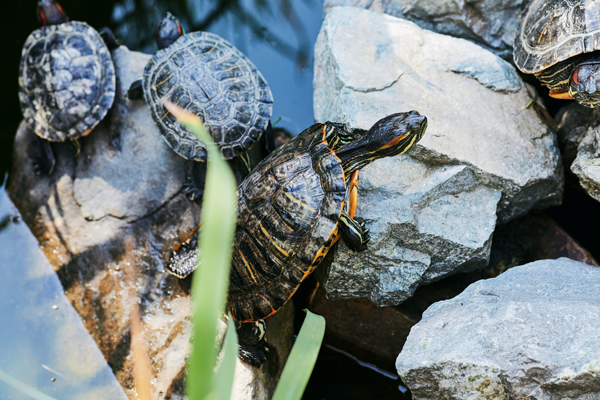
While turtles are one of the most fascinating creatures to live on this planet, they do require regular care and attention when kept as pets. Their habitat needs to suit their size and provide the balance of swimming and land time. Some states and territories also require pet owners to have a licence to keep turtles, so it is worth checking these details before plunging into pet-parent responsibilities.
Below we have sourced tips and hints to give turtle lovers a peek into amphibious pet ownership.
Habitat and Housing
Turtles can live comfortably in glass tanks and aquariums, but there are several features that your turtle needs to live a long and happy life. Turtles need water to submerge, as well as an area outside of the water for basking. Water needs to increase in depth as the turtle grows. It should also be kept at around 22 degrees Celsius as an ideal temperature for your pet. Any gravel in your turtle’s enclosure should be big enough so that your pet doesn’t swallow it, and regular cleaning of the tank or aquarium will prevent algae and other harmful build-ups.
Light
Sunlight is essential for your turtle’s bone formation and shell hardening. They require around 20-30 minutes of natural, unfiltered sunlight 2 to 3 times a week. Special fluorescent lights can be used, or safe access to sunlight outdoors is another option.
Food
A general rule is that turtles should eat a meal that is around the size of their head. As a carnivorous species, long-necked turtles will eat meals such as insects, tadpoles, small freshwater fish and worms. Whereas short-necked turtles eat a more varied diet, which also includes vegetables and fruits such as spinach, broccoli, apples, pear and more. Adults turtles feed around twice a week, while younger turtles require more regular feeding. Check with your vet for the diet and feeding schedule suitable for your turtles’ age, species and size.
Pet sitter
If you’re planning to go away and engage a pet sitter to care for your turtle, make sure you list the feeding, care and maintenance routine in detail to ensure your pet-pal experiences uninterrupted personalised care while you’re away.
Handy fact sheets and information on care for turtles can be found at: